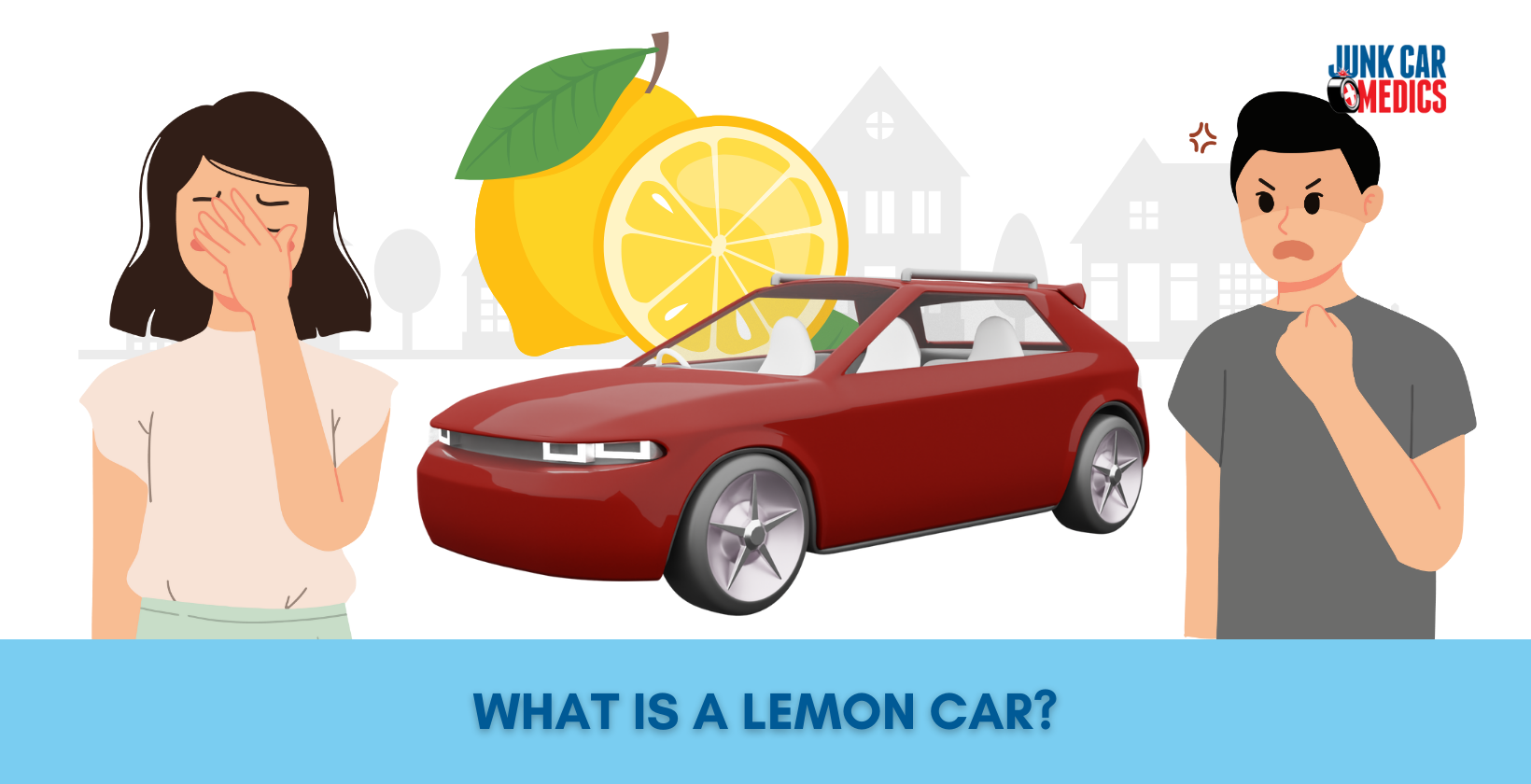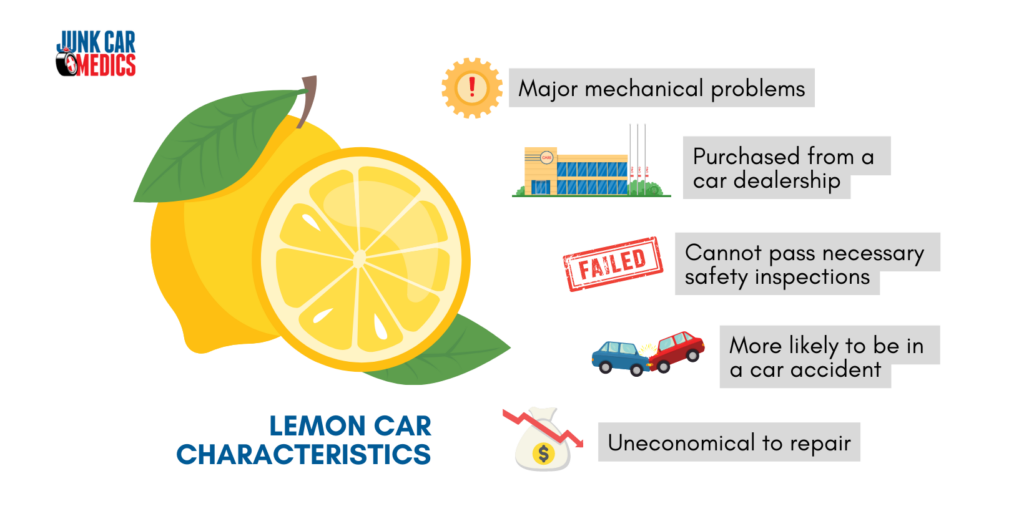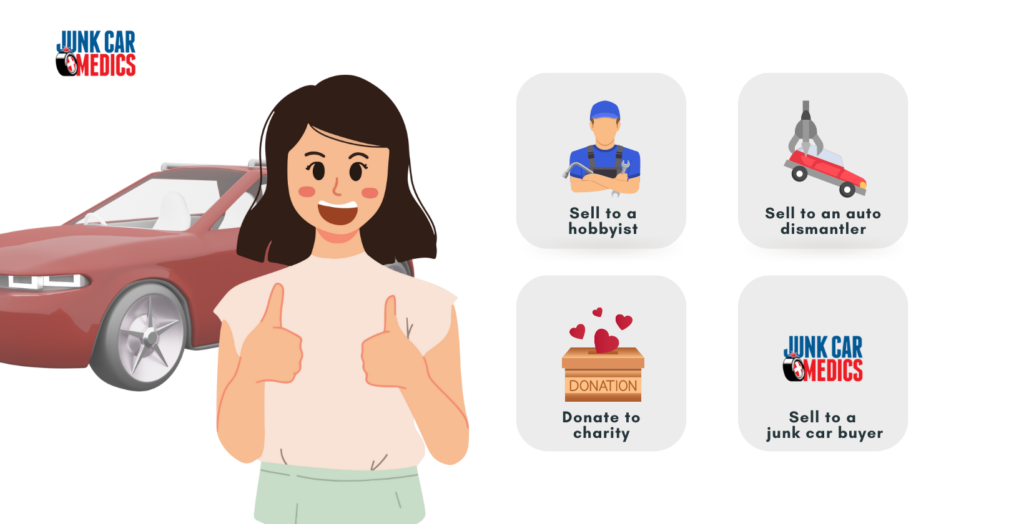What is a Lemon Car?
This guide explains what a lemon car is, all the synonyms of a lemon car, and takes an in-depth look at what is a lemon car, its prices, removal, buyers, laws, and more.

What is The Definition of a Lemon Car?
There are two lemon car definitions. The slang definition for lemon car is a vehicle with a significant mechanical defect that causes malfunction or makes the vehicle unsafe to drive. The legal definition of lemon car varies by state. The federal definition of lemon car is a new vehicle with a major mechanical defect that the manufacturer cannot replace within a reasonable amount of time, and includes about 150,000 lemon cars per year according to Nolo. Lemon cars that are promptly repaired via a recall do not fall under the federal definition of lemon car, nor do those bought used from a car dealer. Some state laws define lemon cars as a vehicle with a major mechanical defect that falls within certain model years.
Cars that are lemons by the legal definition are late model cars. However, when using the slang definition of lemon cars they can be of any year, make, or model. Lemon cars could have one malfunctioning mechanical system or several. Used lemon cars usually show body damage and are rusted cars. Lemon cars do not run, or if they do run they are not safe to drive.
Synonyms of Lemon Cars
There are many other names for lemon cars depending on their condition and type of junk car. Other names for lemon car include old car, damaged car, clunker, beater car, rust bucket, derelict car, decrepit car, wrecked car, or end-of-life vehicles. Lemon cars can also be rebuilt salvage cars, totaled cars returned to the roads, inoperable cars, or unwanted cars.
An In-Depth Look at Lemon Cars
A lemon car is a vehicle that breaks down shortly after buying it. To most people a lemon car is a used car that is purchased from a car dealer that has mechanical problems not disclosed when the vehicle was bought. However, not all lemon cars are bought as used vehicles. In fact, federal lemon laws only apply to new vehicles, and only a handful of states have lemon laws for used cars of certain model ranges. Some synonyms for lemon car include clunker, beater car, derelict car, or decrepit car. Lemon cars are also often end-of-life vehicles.
Lemon cars can be in any condition, but they always have mechanical issues. Lemon cars can have major mechanical problems that cost more than the vehicle owner can afford, even if the repairs are much less than the car is worth. Lemon cars bought used often have multiple failed mechanical systems that alone are minor, but together add up to costly repair bills that can’t be covered by the car owner’s budget.
When defining lemon car as any vehicle purchased with undisclosed mechanical problems that make it unsafe to operate, lemon cars can be of any year, make, or model. However, there are car brands that sell more lemon cars than others when using the federal definition of lemon car that includes only new vehicles purchased that break down within a certain time frame. These brands include Fiat, Cadillac, Porsche, Jeep, Volkswagen, Subaru, Land Rover, and GMC.
Lemon cars in the federal sense are repaired or made right by the manufacturer, and is the source of most vehicle recalls. However, lemon cars that are used vehicles that break down soon after purchase are typically recycled or sold as junk cars because they cost more to repair than is reasonable, contributing to the $67 billion junk car industry. Lemon cars could also be repaired by vehicle owners or private mechanics depending on the extent and type of repairs necessary contributing to the $6.5 billion used auto parts and $78 billion auto repair industry. Lemon cars have little effect overall on any one industry or market.
How does a car become a Lemon Car?
There are two main ways a car becomes a lemon car.
- A new car becomes a lemon car when it has a manufacturer defect and cannot be reasonably repaired. According to federal law, a car is only a lemon car if it has a defect that should have been repaired by the manufacturer, but they were unable to do so. This type of lemon car is rare and encompasses about 1.1% of all new vehicle sales.
- A used car becomes a lemon car when the used car dealer knows of major mechanical defects and does not disclose them at the time of sale. Used car dealers prey on those desperate for cheap transportation. As such, many cash used car lots slap the mandatory “As Is” sign on the vehicle’s window and fails to disclose any issues whatsoever. The dealer is usually able to “inspect” the vehicle themselves for the buyer to register the vehicle, allowing them to bypass disclosing serious mechanical or safety issues. The only states that define used cars with major mechanical issues as lemon cars are Connecticut, Massachusetts, Minnesota, New Jersey, New Mexico, and New York.
- A car becomes a “lemon car” when it has a rebuilt salvage title but is actually unsafe to drive. Most states have laws that allow salvage cars to be rebuilt and titled as rebuilt salvage vehicles for sale and operation as used cars. Many rebuilt salvage vehicles are returned to the roads without passing the necessary safety inspections due to flaws in the system that allow the repairs and inspections to be carried out by the same auto repair shop. However, these lemon cars are rarely protected by law.
It is important to note that the legal definition of lemon car varies from state to state, which means that how cars become lemon cars will also vary by jurisdiction.
What makes a car a lemon car in the eyes of the law?
Federal law regarding lemon cars comes from the Magnuson-Moss Warranty Act of 1975, in which it was determined that there were implied and explicit warranties that should be reasonably expected by consumers. The Act established a consumer’s right to assume an implied warranty of fitness for a particular purpose, and in what conditions and in what ways a warranty claim can be remedied. These laws are complex and it is best to talk to an attorney if you need legal advice.
There are 3 key requirements of dealers in new and used vehicles based on the Magnuson-Moss Warranty Act.
- New car dealers, used car dealers, and junk car dealers must provide a buyers guide that either provides express warranties or is marked “As Is.”
- New car dealers offer an implied warranty that the new vehicle will be free from defects for a specified time period. The exact time period is set at the state level, although there are federal guidelines that must be followed. The implied warranty only applies to first time owners of new vehicles according to federal law, but some state laws protect used car sales for short periods as well.
- When a warranty claim is filed the car dealer must repair the vehicle, if possible. When repairs cannot be made within a specified amount of time the dealer must replace the vehicle entirely or offer other compensation.
It is important to note that each state has their own statute of limitations, or time allowed to file a lemon law claim. Remedies and compensation for lemon cars is also governed by each independent state. The only states that protect lemon cars bought as used vehicles are Connecticut, Massachusetts, Minnesota, New Jersey, New Mexico, and New York.
What are characteristics of lemon cars?
Lemon cars have 5 common characteristics, regardless of the definition used.
- Lemon cars have major mechanical problems that make them inoperable or unsafe to drive.
- Lemon cars are purchased from a car dealership. Cars purchased from individuals are never considered lemon cars.
- Lemon cars are unable to be legally registered vehicles because they cannot pass the necessary safety inspections. However, a lemon car could come with the inspection documentation needed for registration without actually meeting requirements with the buyer none the wiser.
- Lemon cars are more likely to be in a car accident. According to the National Highway Traffic Safety Administration, 2% of vehicle crashes are caused by mechanical failure.
- Lemon cars are uneconomical to repair. This includes repairs that are reasonable by fair market value but unaffordable to the lemon car owner. A study by AAA found that about a third of Americans can’t afford repairs of as little as $500, which leaves out most of the serious mechanical failures common to lemon cars.
Beyond these, the characteristics common to lemon cars depends on the jurisdiction and how the state defines lemon cars.
Is a lemon car a junk car?
Not all lemon cars are junk cars. Lemon cars as federally defined are junk cars because they cannot be reasonably repaired by the manufacturer. Lemon cars as defined by states that also protect some used car sales are junk cars because they cannot be reasonably repaired by the used car dealer. Lemon cars as a slang term are usually junk cars because they are not economical to repair, but some lemon cars can and are repaired and returned to the roads.
What is a Lemon Car worth?
Lemon cars are rarely worth more than their scrap metal. Late model lemon cars do not have in-demand parts because all of the cars of that make and model will have similar issues. Used cars that are lemons are rarely worth more than scrap because they are in such poor mechanical condition none of their parts can be reused or resold.
What are price ranges for lemon cars?
The price ranges for lemon cars depend on the year, make and model of the vehicle, as well as current local scrap metal prices. These are the only factors that affect the price ranges of lemon cars because they only have value as scrap. The year, make, and model of the vehicle tell vehicle recyclers how much of what types of metals were used to make the vehicle, and therefore how much it can be worth.
Keep in mind that local scrap metal prices are affected by many factors including global market demand and politics. These issues can cause scrap metal prices to vary greatly and sometimes without warning.
What are the most valuable car parts on lemon cars?
The most valuable car parts on lemon cars are the frame, body, engine, drive train, and transmission. This is because these car parts contain the most recyclable aluminum, steel, and iron alloys when the lemon car has no value as salvage. The catalytic converter is also valuable because it contains small amounts of highly priced metals.
What are the most valuable scrap metals on lemon cars?
The most valuable and recyclable metal on lemon cars is steel and other iron alloys. Iron alloys like steel and cast iron are in high demand because it takes less energy and resources to recycle these than to produce new steel. In addition, the World Steel Organization reports that 55% of a vehicle is made of recyclable steel and metal allows. Transmissions are also rich sources of aluminum, which is always in demand. There are small amounts of other precious metals found in cars, including gold, platinum, rhodium, and palladium, among others.
What to do with a Lemon Car?
Getting rid of a lemon car is easier than you might think. Here are 4 things you can do with a lemon car.
- Sell the car to an individual for use in a hobby. Artists working with metal sculptures, blacksmiths keeping the trade alive, and hobbyists trying to mimic History Channel’s Forged in Fire all have use for lemon cars. It is easy for them to harvest steel and iron alloys from lemon cars and it is cheaper for them than other sources of steel. It is hard to find this type of buyer for a lemon car and could take some time, but it could net you a bigger profit.
- Sell the car to an auto dismantler or vehicle recycler. Lemon cars that cannot or should not be repaired need to be sent on their recycling journey. This usually starts with an auto dismantler that takes the car down to its smallest parts, then sorting those parts into various recyclable materials, disposing of the waste. Not all auto wrecking yards buy lemon cars from the general public so it’s always best to call and ask before trying to have the lemon car delivered to the junk car facility.
- Donate the car to a charity. Charities accept junk car donations, including lemon cars. However, the charity is likely to get less than wholesale value for the vehicle. It is usually more profitable for the charity to sell the lemon car for scrap and donate the funds directly.
- Sell the lemon car to a junk car buyer. An experienced junk car buyer will be able to pay cash for the lemon car then pass it on to the next logical facility on the vehicle recycling journey. Using a junk car buyer is the easiest and fastest way to get rid of lemon cars.
Many people abandon lemon cars to get rid of them because they don’t know what to do with these unwanted vehicles. Most states have laws against abandoning cars, and owners of lemon cars can be fined or charged with a misdemeanor when they abandon it.
Can I sell a lemon car without a title?
In some cases you can sell a lemon car without a title. It depends on the laws for your state, which can be discovered with your local Department of Motor Vehicles (DMV). To sell a lemon car without a title one must have previously titled the vehicle in their name. Some states allow for a lemon car to be sold without a title when the transfer of ownership wasn’t completed but the current owner has other proof of ownership. Not all states allow this, and additional notarized paperwork may be necessary to sell a lemon car without a title when you never titled or registered it in your name.
Can I sell a lemon car with no registration?
Yes, you can sell a lemon car with no registration. Lemon cars cannot pass safety inspections necessary for registration. Lemon cars sold by used car dealers may come with the necessary inspection documentation, allowing the vehicle to be registered. In any case, the registration is never required to sell lemon cars, but you can use a previous registration to prove ownership in most states when the title is missing.
Who buys lemon cars?
There are 4 main places that buy lemon cars as defined above. The places that buy lemon cars are individuals using them for hobbies, auto dismantlers, vehicle recyclers, and junk car buyers.
How to choose a junk car buyer
The easiest and fastest way to sell a lemon car is with a junk car buyer. Not all junk car buyers are the same. Here are some things you can do to make sure you are choosing the best junk car buyer.
- Check with local government, Chamber of Commerce, or Better Business Bureau to ensure that the junk car buyer is appropriately licensed, legally operating, and in good standing.
- Talk to friends and neighbors and read online reviews to ensure you are working with a junk car buyer with a reputation for excellent customer service and fair prices for lemon cars.
- Get multiple junk car quotes so that you can make sure you’re getting the best price for your lemon car.
- Make sure you know exactly what is included in the quote for your lemon car. Junk car removal should be included.
- Determine if the junk car buyer will be able to assist in selling the lemon car without a title, if needed.
Junk Car Medics meets all of these points and more with a quick, easy, painless, and rewarding process for selling lemon cars. We have licensed locations in all 50 states, with a reputation backed by thousands of positive online reviews. Junk Car Medics is able to pay the best prices for lemon cars by partnering with the top vehicle recyclers in your area.


